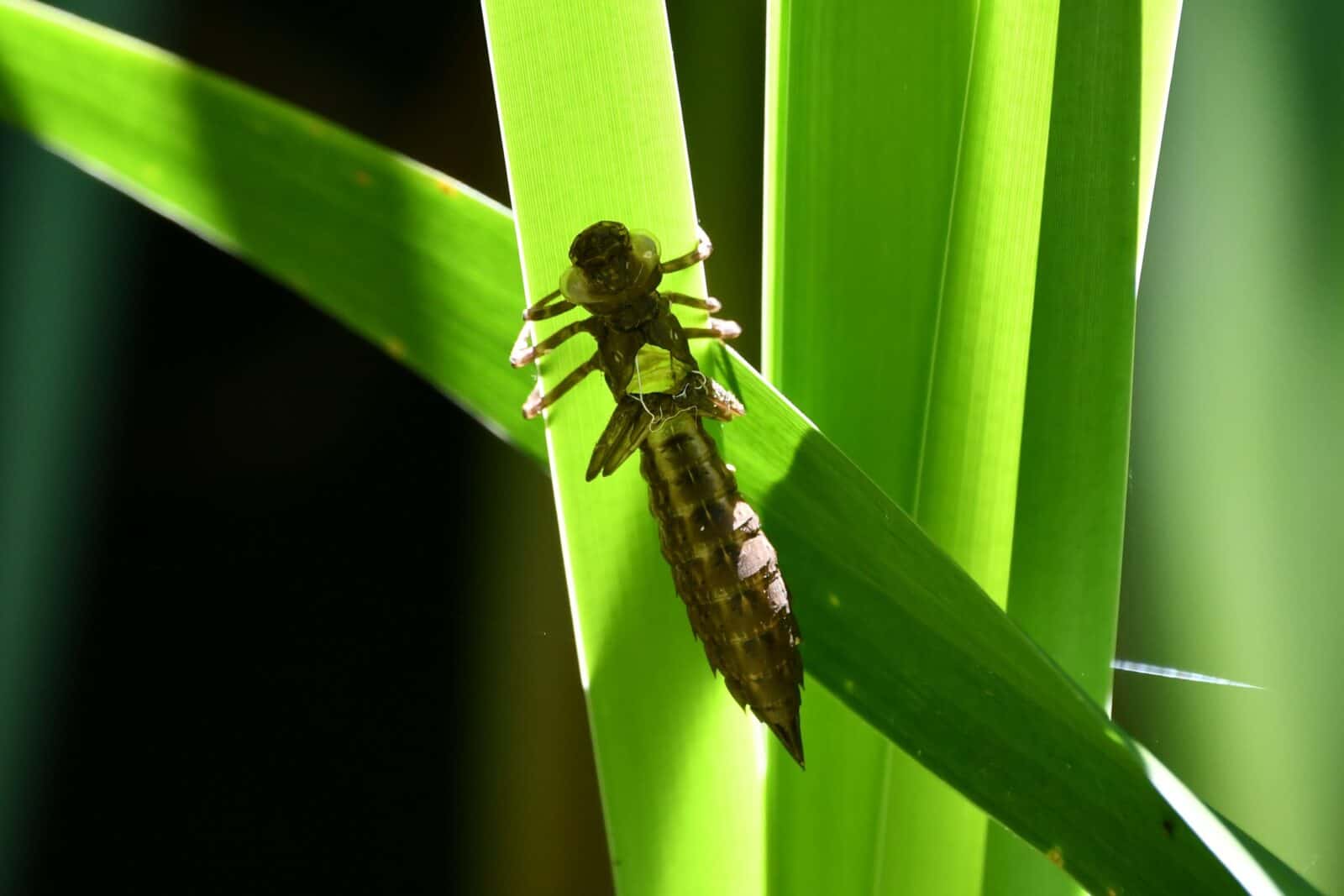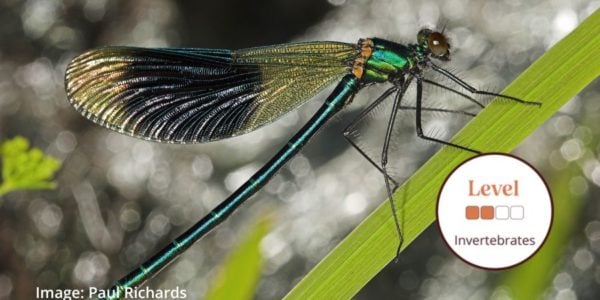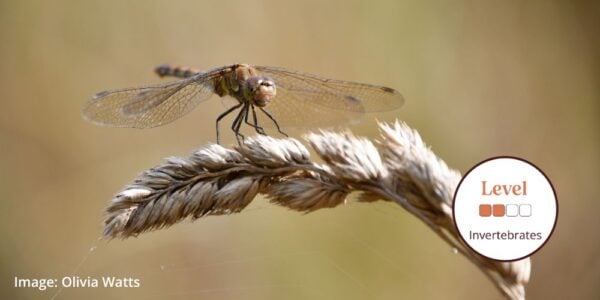If you are considering delving into the identification of dragonfly and damselfly larvae or exuviae in the UK, then this intermediate course is ideal for you!
Through a combination of taught classroom content, lab-based workshop and outdoor fieldwork, you will gain confidence in using the identification guide to identify dragonfly and damselfly larvae and exuviae.
This course will include:
- A description of the lifecycle of dragonflies and damselflies explaining the role of larvae and an explanation of exuviae
- The external (morphological) features used in larvae and exuviae identification
- Practical experience using the ‘Field Guide to the Larvae and Exuviae of British Dragonflies’ by Steve Cham to determine specimens accurately to species level
- Practical experience observing larvae and exuviae ID features using a microscope
- A description of the lifecycle of dragon and damselflies explaining the role of larvae and an explanation of exuviae
- The external (morphological) features used in larvae and exuviae identification
- Practical experience using the ‘Field Guide to the Larvae and Exuviae of British Dragonflies’ by Steve Cham to determine specimens accurately to species level
- Practical experience observing larvae and exuviae ID features using a microscope
- Guidance on how to take your interest further and contribute to the British Dragonfly Society Recording Scheme, and therefore the conservation of dragonflies and damselflies
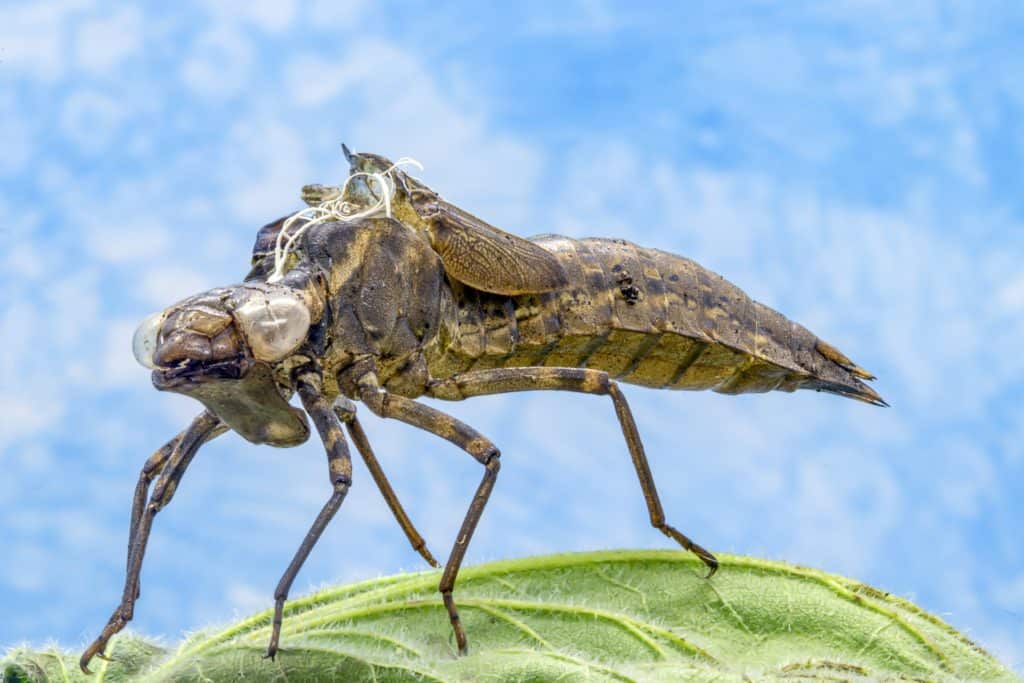
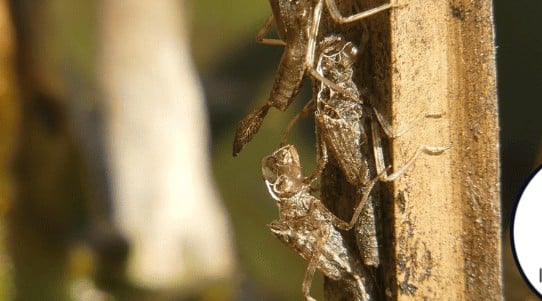
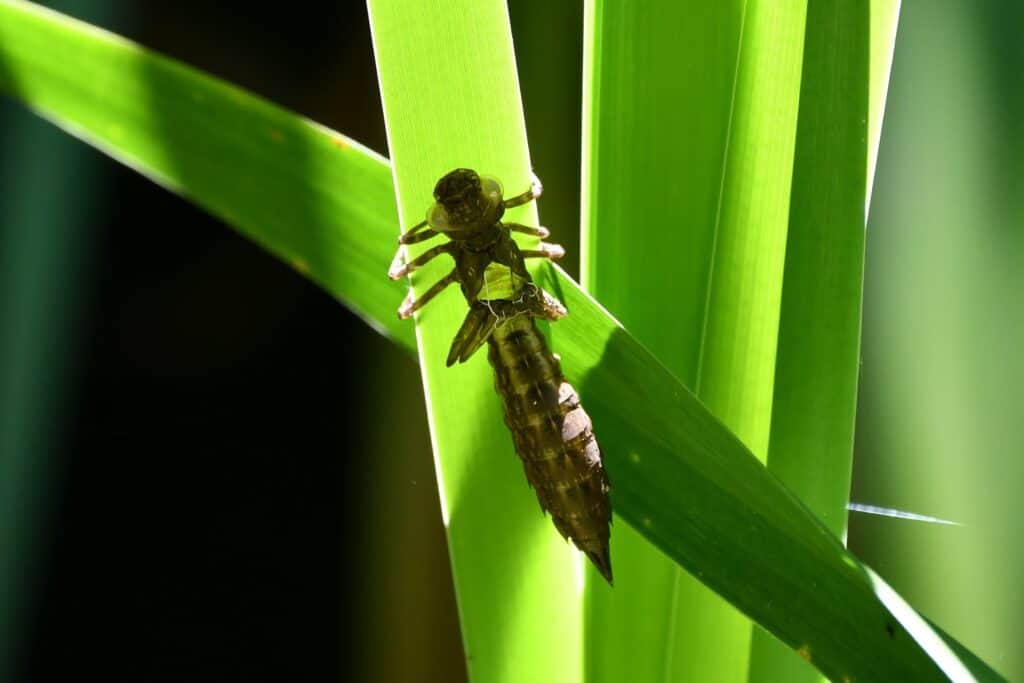
Read More
This course commences with an introduction to dragonfly larvae and the part they play in the dragonfly life cycle. You will then be introduced to the morphological features used to identify specimens and an indoor practical workshop then focuses on the identification of exuviae. Using the ‘Field Guide to the Larvae and Exuviae of British Dragonflies’, by Steve Cham, you’ll examine and identify a wide variety of different species, including both common species and rarer ones that can be trickier to find.
After lunch you will focus on larvae, dipping in the course venue pond and (if not too cold!) hopefully finding some specimens enabling us to practise some hands-on identification. The afternoon will be completed by returning to the classroom to discuss the importance of building your own reference collection in enabling you to make and submit accurate biological records.
By the end of this course, you will be able to:
- Understand the life cycle and the role played by larvae
- Understand the names and location of external morphological features important in identifying larvae and exuviae
- Display knowledge of and practical experience using the identification text by Steve Cham
- Demonstrate practical experience of using a binocular microscope to identify exuviae in many cases to species
- Demonstrate practical pond dipping experience and identifying diagnostic features on living larvae in the field
- Understand how to take an interest in this group of insects further
Who should attend? – Anyone wishing to know how to identify dragonfly larvae and exuviae. The text used is accessible but the subject matter can be challenging so you should enjoy a challenge! (hence the course being listed as intermediate).
Knowledge level – Intermediate. Level descriptors can be found on the following webpage: Framework and Course Level Descriptors
Prior knowledge – No existing knowledge or experience is required for this course. Binocular microscopes will be used, but no previous experience is necessary.
PLEASE NOTE: There is no accommodation, refreshments, or meal facilities provided with this course. Refreshments (tea and coffee) will be available. If we are unable to reach viable numbers for this course, we will inform you of the course cancellation 4-5 weeks prior to the course run. We would recommend when purchasing accommodation and/or travel you should take out your own insurance.
Bookings will close if course capacity is reached.
Please email [email protected] if you have any questions.
About the Tutor
Sue Rees Evans
Sue Rees Evans is the Shropshire County recorder for Dragonflies and Damselflies and the Odonata Tsar for the Shropshire Ecological Data Network. Sue has also written and manages the Shropshire Dragonflies website which serves as an online atlas and hosts the Shropshire Dragonfly Watch flight season blog. With a real enthusiasm for hands on teaching, Sue has taught numerous courses on Dragonfly and Damselfly identification for over 10 years for organisations including the Field Studies Council.
Example Timetable
Example Timetable
This timetable is subject to change but should give a clear outline of what to expect.
- Please arrive in time for the course to start promptly at 10:00
- The course will end at 17:00
10:00 - Classroom session - introducing dragonflies and damselflies and their life cycle
10:45 – Exuviae identification workshop using binocular microscopes
13:00 – Lunch (not provided)
14:00 - Field work at course venue - dipping in ponds and learning how to identify living larvae
16:00 - Classroom session - what next? How to take your interest further and actively contribute to the conservation of dragonflies and damselflies
17:00 - End of course
NB. The lunch hour may be reduced to allow short breaks in the morning and afternoon sessions.
Please note accommodation and an evening meal are not included.
What's Included
The course has been carefully created by expert tutors and educators to help you build your knowledge and apply it within the field surrounded by like-minded individuals.
The course includes:
- Classroom learning covering the theory of the species
- Field excursions to apply new knowledge
- Expert tuition for which the Field Studies Council is renowned
- Clear objectives and progression
You can rest assured that the absolute best content from an expert in environmental education will be provided. In choosing a Field Studies Council course, you will be joining thousands of people who learn with us each year.
Bursaries and Subsidies
Student Discount
This course is eligible for a student discount. If you are a current student, please use discount code BioStudent20 at checkout for 20% off all Biodiversity courses.
Natural History Bursaries
There are a number of natural history bursaries available to help with the cost of your course. To find out if you and your chosen course are eligible, read more here.
Before You Attend
What to Bring
- Notebook and pencil/pen
- Lunch and refreshments
- Sensible footwear and clothing for being outdoors
- Small bag to carry personal items
Recommended Literature
The main text used on the course is:
The tutor will provide copies for all participants to use on the course and copies will be available for sale at £7.50 on the day (cash/cheque only).
There will be a member of staff with first aid training and access to a first aid kit on site. If you have special medical or access requirements, please let us know as soon as possible so we can plan the course.
Opportunities to attend this course
-
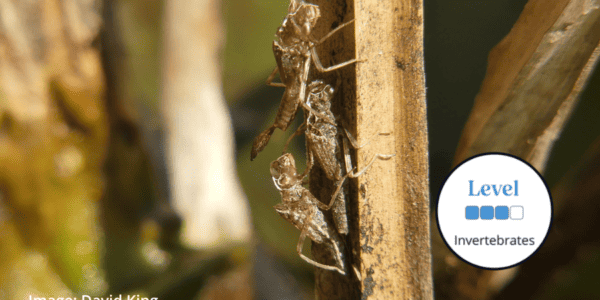
Sat 07, September 2024 10:00 - 17:00
If you would like to book accommodation and meals at Preston Montford Centre, please email [email protected]. Please note the Centre may not be able to guarantee accommodation and meals during this course.
No current dates for this course? Click here to view all the upcoming Natural History courses.
Progress Your Learning
This is a training course from the Field Studies Council, delivered by expert tutors with an approachable learning style. After attending this course, you may like to progress your learning with further relevant courses or branch out into other areas of natural history. The Field Studies Council offers both online and in person courses, so you can choose the learning style that suits you best.
The course gives you the opportunity to immerse yourself in a new subject and acquire novel skills. Our online portal gives you time to study at your own pace and fit the lessons around your own schedule.
If you have any questions about our courses please check our Frequently Asked Questions or email [email protected].
Group Bookings Made Easy
If you have a group of 10 or more individuals wanting to complete one of our courses, our team are available to discuss your options – from discounts to private team courses. Find out more!
You can rest assured that the absolute best content from an expert in environmental education will be at your fingertips. In choosing a Field Studies Council course, you will be joining thousands of people who learn with us each year.

